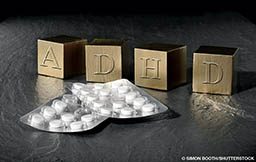Attention-deficit/hyperactivity disorder (ADHD), formerly known as attention-deficit disorder (ADD), is a neurobehavioral disorder that can involve difficulty paying attention, impulsiveness and restlessness. These symptoms may interfere with learning and daily functioning, and in divers and prospective divers they raise important questions about fitness to dive. The symptoms are related to an alteration in brain development starting in childhood, and the disorder may persist in adulthood.
The Centers for Disease Control and Prevention (CDC) reports that up to 11 percent of children have ADHD, while the National Institutes of Mental Health (NIMH) indicates that 4.1 percent of adults have it. It seems to occur more frequently in boys than girls. The symptoms are not the same in everybody, and in mild cases the individual may have problems only when engaging in certain tasks. For example, an adult may do very well throughout life until a new computer system with a very strict workflow is installed at his or her workplace. Alternatively, a child with ADHD who is placed in an academic setting without much structure might begin to have problems.
People with ADHD are at increased risk of being involved in motor vehicle accidents and sustaining injuries that lead to emergency room visits. Other conditions commonly associated with ADHD, particularly untreated ADHD, are depression, anxiety, cigarette smoking and substance abuse.
ADHD is treated with cognitive behavioral therapy and medications including stimulants and antidepressants. None of the medications used to treat ADHD have been tested for possible interactions with diving. To better understand how ADHD might affect safe diving, we ask the experts.
What are the classic symptoms of ADHD?
Steven Altchuler, M.D., Ph.D.: The symptoms vary; among the most common are inattention, hyperactivity and impulsivity. People with ADHD might make careless mistakes, not pay attention to details, not finish tasks, be forgetful or have difficulty managing tasks that must be done in a specific order. They might fidget, interrupt others or have difficulty waiting their turn.
The symptoms of ADHD change over time. As people grow up, symptoms may become less severe or even disappear. Someone who had ADHD as a child may do perfectly well as an adult.

How is ADHD diagnosed?
Timothy Wilens, M.D.: ADHD is a clinical diagnosis predicated upon careful review of the diagnostic criteria in the Diagnostic and Statistical Manual of Mental Disorders, fifth edition (DSM-5), with the individual and, if the patient is a child, the family. While neuropsychological testing may be helpful to examine co-occurring cognitive or psychiatric problems, it is not necessary to diagnose ADHD. The diagnosis requires that the individual have a sufficient number of symptoms from each symptom cluster listed in the DSM-5; this establishes context for the functional impairment and demonstrates that it is attributable to ADHD rather than another disorder.
How is ADHD treated?
Altchuler: The most common treatment is the use of stimulant medications such as methylphenidate (Ritalin). Students can benefit from measures to minimize distractibility in the classroom and opportunities to move around. They may also do well with additional time to complete standardized tests such as college entrance exams. Other medications, including the antidepressant bupropion (Wellbutrin), are used to treat adults.
Wilens: In addition to prescribing medication, which is considered the first line of treatment, the doctor might also consider the individual’s academic or occupational setting and interpersonal or family issues. Appropriate accommodations in various settings (e.g., school, work) may be necessary. Psychotherapies directed at the person with ADHD and/or the family can be very useful for addressing core and associated symptoms.
What additional risks might a scuba diver with untreated ADHD be taking on?
Altchuler: Divers with ADHD might have difficulty concentrating or paying attention or might be easily distracted, particularly if they are multitasking. For example, observing a beautiful coral reef, maintaining buoyancy control, monitoring gas supply, fulfilling a decompression obligation, controlling depth or ascent rate and paying attention to a dive buddy’s location might prove overwhelming. Diving in an overhead environment where strict attention to detail is a life-or-death matter may be challenging.
Wilens: The many tasks involved in a successful diving venture may challenge individuals with ADHD, particularly if they are untreated. Difficulties with associated neurocognitive functions such as working memory (remembering and managing short-term issues) and executive functioning (e.g., organization) may also adversely affect diving.
What are the risks for divers with ADHD who are successfully treated with medication?
Altchuler: Little is known about the effects of stimulant medications such as methylphenidate at depth. Theoretically, stimulants and bupropion might increase the risk of oxygen toxicity. Practical concerns may exist if somebody who is taking methylphenidate or another medicine for ADHD surfaces and is acting unusual. This might prompt the question of whether the changes are related to the medicine or are indications of decompression illness.
Wilens: There are numerous studies and reviews of studies of the use of ADHD medications by people of various ages. Surprisingly few of these studies consider this use in athletic contexts, and none to my knowledge focused on diving. Our laboratory at Massachusetts General Hospital has completed studies of high-dose amphetamine administration in adults with ADHD who were comprehensively tested at baseline and again six months later using multimodal cardiovascular imaging and graded-exercise testing. We failed to find concerning adverse cardiovascular outcomes but did note nonclinically significant slower heart-rate recovery after exercise, which means longer recovery times following peak exercise performance. In standard atmospheric testing we did not find varying rates of oxygenation or cardiac output or any evidence of arrhythmias. Of interest, after thorough diagnostics many professional athletes are treated for ADHD and demonstrate improved overall outcomes and excellent toleration of the medications.
Can people with ADHD dive if they stop taking their medication?
Altchuler: Certainly, if a diver no longer requires medication, then he or she should stop taking it. We are concerned about whether the diver can pay adequate attention to detail and the dive plan to be able to dive safely. Frequently, school-age children and teenagers are given “vacations” from their ADHD medications during the summer. When people need medication to function well in school, where paying attention to detail can affect their grades, we are even more concerned about them paying attention while scuba diving, where attention to detail can become a life-or-death matter.

So whether someone with ADHD can scuba dive really depends on whether the person in fact has ADHD and what treatment is needed. If the person needs stimulant medication to function normally, we have concerns about how the medicine would affect him or her when scuba diving. The U.S. Navy medically disqualifies from diving a person with active ADHD, but “a history of ADHD greater than 1 year prior to military service is not disqualifying.” Use of the medicines that treat ADHD is similarly disqualifying.
Wilens: While we do not have adequate data on the effects of stimulants or nonstimulants in diving conditions, we are accumulating data on the positive effects of treatment on other complex activities such as driving. These data show improvements in all aspects of driving behavior in simulators. There are also large epidemiological studies that demonstrate a lower overall risk for motor vehicle accidents with treatment. If we were to extrapolate from other complex behaviors that are aberrant in ADHD, I would recommend treatment over no treatment.
What should be done when a prospective diver reports a history of ADHD?
Altchuler: The first thing to do is find out if the person is taking medicine or undergoing some other treatment for ADHD. If the prospective diver is a teenager, do not ask the parents, ask the youth directly. In too many cases teenagers start taking a medication, take it for several months, notice no difference and stop taking it.
People not undergoing treatment need an operational diving examination. We do one for all divers who are new to us. We observe their functioning starting in easy diving environments and progress to more challenging environments to determine if they can dive successfully. It’s critical to observe divers as they progress to more challenging environments. As the number and complexity of tasks divers must do increases, so does the likelihood that ADHD will cause problems. Things an experienced diver might find routine can be overwhelming to a new diver, particularly one with ADHD. Even dives in calm conditions involve management of many tasks, and additional challenges such as choppy seas, low visibility and cold water might make the situation overwhelming.
A challenge diving physicians face is that many recreational diver health forms ask only, “Are you currently taking prescription medications?” A teenager or young adult learning to dive during the summer and taking a “medication vacation” can truthfully answer “no.” Health forms typically do not ask specifically about ADHD but rather list “behavioral health, mental or psychological problems.” While we in the medical field may consider ADHD to fall in this category, the diver or the diver’s parent may think of ADHD as only a school problem and again truthfully answer “no.”
The next challenge is that the diver’s primary physician who completes the form may lack knowledge about dive medicine and the potential for enhanced side effects in high-partial-pressure oxygen environments. The primary doctor may also lack knowledge about the multiple tasks a scuba diver must perform to be able to dive safely.
Divemasters and instructors cannot be expected to be medical experts. They should, however, be observant. Simple questions such as, “Did you take any prescription medicines in the past year, and did your doctor know about them when he completed this form?” may provide useful information.
Wilens: To Dr. Altchuler’s comprehensive response I would add only the recommendation to determine if the individual has been swimming, freediving or scuba diving in the past, whether the person took medications while doing so and how his or her experience was with or without them, noting in particular any adverse effects. These data may help guide the conversation.
Any further comments?
Altchuler: If a person comes to us and says he has ADHD, we should ask if he needs treatment for it in any part of his life to be able to function well. If he needs medications, it is probably best that he not scuba dive. On the other hand, if he functions very well without medications, he is at higher risk for having difficulty while diving but may well be able to do so. Some divers with ADHD might benefit from limiting themselves to clear, calm, warm water and not going beyond 60 feet.
Wilens: ADHD itself should not automatically exclude anyone from diving. Untreated or undertreated ADHD is what places an individual at the greatest risk of difficulties while executing complex actions. The available medications seem to be effective and well tolerated in athletes, and the limited data pertaining to the use of stimulants by adults undergoing multimodal cardiovascular assessments do not indicate difficulties during peak performance. I recommend that divers with ADHD get treatment, that individuals who are medicated for ADHD dive carefully and that doctors of divers with ADHD monitor the effects of the divers’ medications on their overall performance.
Meet the Experts
Steven Altchuler, M.D., Ph.D., is a divemaster who has been diving since the early 1960s. He practices psychiatry at the Mayo Clinic in Rochester, Minn., where he is a member of the Division of Preventive, Occupational and Aerospace Medicine, the division that operates Mayo Clinic’s hyperbaric medicine program.
Timothy Wilens, M.D., is chief of the Division of Child and Adolescent Psychiatry and co-director of the Center for Addiction Medicine at Massachusetts General Hospital in Boston, Mass. He specializes in the diagnosis and treatment of young persons’ substance-use disorders, bipolar disorder and ADHD across the lifespan. Wilens is a consultant on ADHD and substance-use disorders to the National Football League, Major League Baseball and other organizations.
| © Alert Diver — Q3 2017 |